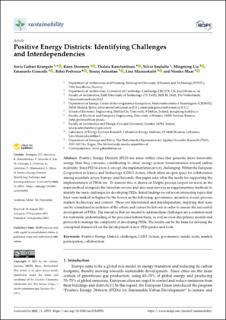| dc.description.abstract | Positive Energy Districts (PED) are areas within cities that generate more renewable energy than they consume, contributing to cities’ energy system transformation toward carbon neutrality. Since PED is a novel concept, the implementation is very challenging. Within the European Cooperation in Science and Technology (COST) Action, which offers an open space for collaboration among scientists across Europe (and beyond), this paper asks what the needs for supporting the implementation of PEDs are. To answer this, it draws on Delphi process (expert reviews) as the main method alongside the literature review and also uses surveys as supplementary methods to identify the main challenges for developing PEDs. Initial findings reveal seven interacting topics that later were ranked as highest to the lowest as the following: governance, incentive, social, process, market, technology and context. These are interrelated and interdependent, implying that none can be considered in isolation of the others and cannot be left out in order to ensure the successful development of PEDs. The resources that are needed to address these challenges are a common need for systematic understanding of the processes behind them, as well as cross-disciplinary models and protocols to manage the complexity of developing PEDs. The results can be the basis for devising the conceptual framework on the development of new PED guides and tools. | en_US |

